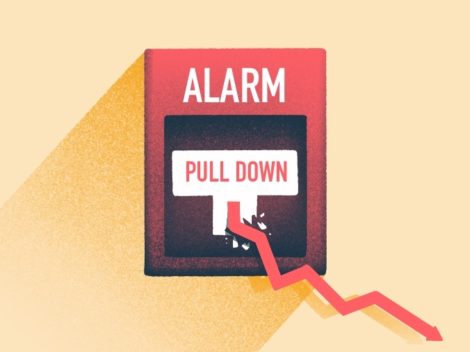As the decade comes to a close, Crunchbase News – like all media outlets in December – is contractually obligated to publish a list of the biggest moments (we’re kidding, mostly). And since startups and venture capital are our jam, we figured we’d round up the biggest venture deals of the 2010s.
Subscribe to the Crunchbase Daily
Looking back at the past decade brings us to simpler times, when the largest venture funding rounds in the world were only in the nine-digit territory. In 2010, Uber was in its infancy, the term “unicorn” had yet to be coined, and people were still doing business with BlackBerries.
A few disclosures: this list includes companies that raised money in venture funding rounds (Series A, B, etc). It doesn’t include venture funds, a couple of which showed up in Crunchbase data, or other types of financing (e.g. private equity rounds). We also omitted venture rounds raised by pharmaceutical companies, because they tend to be outliers in the world of startups and have to raise unusually high amounts of capital (clinical trials ain’t cheap).
It’s been quite the decade, and the world of venture capital, startups and both the private and public market have changed a lot. Let’s look back at the rounds that made our jaws drop.
2010: Better Place Series B ($350 million)
Better Place’s $350 million Series B took first place for the largest venture funding round of 2010 after we kicked Betta Pharmaceuticals out of the running. It’s surprising looking back at 2010 and seeing that $350 million was the largest venture funding round for a startup that year, when now rounds are regularly in the hundreds of millions and often in the billions. Still, $350 million is a lot even now for a Series B round. Better Place’s Series B ended up being the company’s largest funding round (it later raised a $200 million Series C and $100 million in another venture round). The company had about $945 million in total funding, according to Crunchbase, but is now closed.
2011: JD.com Series C ($1.5 billion)
JD.com’s Series C marks the first $1 billion+ funding round of the decade, and the only one of 2011. It was also the largest venture funding round in the company’s history, coming in at $1.5 billion. JD.com, which later went public, was followed by Groupon in 2011 in terms of funding round size. Groupon raised $950 million for its Series D–nearly at the 10-digit mark, but not quite.
2012: GreatPoint Energy Series D ($420 million)
Greatpoint Energy’s Series D, led by Wanxiang America, was 2012’s largest venture capital round, and the company’s last fundraising to date. In terms of funding round size, GreatPoint Energy was followed in 2012 by Axel Springer Digital Classified’s $312 million venture funding round and JD.com’s $250 million Series D.
2013: Pivotal Series A ($946 million)
Pivotal took the title of 2013’s largest venture funding round. More notably, the nearly $1 billion round was for its Series A after spinning out of EMC and VMWare. The company went on to raise $758 million more in funding ($105 million in its Series B and $653 million in its Series C) before it went public. Earlier this year, it was acquired by VMWare.
2014: Uber Series D ($1.4 billion)
Fidelity was the lead investor for Uber’s Series D in 2014, when the ride-hailing company was rapidly expanding. Though $1.4 billion is quite a chunk of change, it wasn’t the largest round Uber would raise. The company also pulled in $3.5 billion from Saudi Arabia’s Public Investment Fund in its Series G, and $7.7 billion in secondary market funding in 2017, for example.
2015: Airbnb Series E ($1.5 billion)
2015 saw consumer brands taking in the largest funding rounds of the year, with Airbnb leading the pack (though Uber did have a $1.6 billion convertible note round). Airbnb’s $1.5 billion Series E was the largest venture funding round, but Uber also had a $1 billion Series E, a $1 billion Series F, and companies like Lyft and SoFi also had their own $1 billion venture funding rounds.
2016: Didi Chuxing ($4.5 billion) and Ant Financial Series B ($4.5 billion)
Ride-hailing companies were among the most talked about startups in the United States in the 2010s, and they were no less prominent in China. Didi Chuxing brought in $4.5 billion, tying with Ant Financial for the spot of the largest venture funding round of the year. Uber wasn’t far behind with its $3.5 billion Series G, and China’s Meituan-Dianping came in with $3.3 billion.
2017: WeWork Series G ($4.4 billion)
Before its failed IPO in 2019, WeWork was a rising star and nabbed the spot for the largest venture funding round in the world in 2019. The Softbank Vision Fund, of course, was the lead investor for the deal. Along with being the biggest venture round in 2017, WeWork’s Series G is also the company’s largest funding round to date. WeWork went on to raise billions more before its attempt to go public earlier this year.
2018: Ant Financial Series C ($14 billion)
Ant Financial holds a number of records on this list: largest venture funding round of 2018, largest venture funding round of the decade ($14 billion!), and the only company to have the largest round of multiple years (it tied with Didi Chuxing for the largest round in 2018). Temasek Holdings led the Chinese company’s Series C, which is its most recent funding round to date.
2019: Tenglong Holding Group Series A ($3.7 billion)
Tenglong Holding Group had the largest venture funding round of this year, unless any companies are planning on announcing a nearly $4 billion round during the holiday week. Morgan Stanley Venture Partners led the giant Series A that was announced earlier this month. Tenglong wasn’t the only Chinese company pulling in billion dollar rounds this year–the top three largest venture rounds of 2019 were for companies based in China (Kuaishou Technology was second and Chehaduo was tied for third with India’s OYO).
After Looking Back We Look Ahead
Recent years have seen so much capital in the market that funding rounds at each stage have swelled in size. Companies are staying private longer, thanks to 2012’s JOBS Act, and raising more money. That could continue next year, if the WeWork fiasco hasn’t discouraged investors from cutting billion dollar checks. Whether we’ll see more companies raising 10 figure rounds, that’s a question for 2020.
Illustration: Dom Guzman

Stay up to date with recent funding rounds, acquisitions, and more with the Crunchbase Daily.


![Illustration of a guy watering plants with a blocked hose - Global [Dom Guzman]](https://news.crunchbase.com/wp-content/uploads/quarterly-global-3-470x352.jpg)
![Illustration of remote meet on cellphone, unicorn chess piece and money. [Dom Guzman]](https://news.crunchbase.com/wp-content/uploads/business-strategy-470x352.jpg)


![Illustration of a guy watering plants with a blocked hose - Global [Dom Guzman]](https://news.crunchbase.com/wp-content/uploads/quarterly-global-3-300x168.jpg)
67.1K Followers